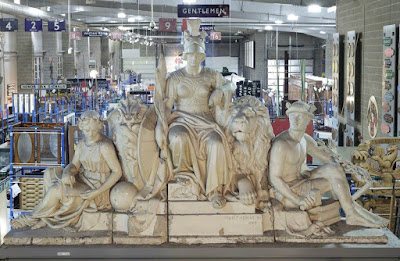The Royals
A Scottish government memo obtained by the Guardian reveals that "it is almost certain" draft laws had been secretly changed to secure the Queen's approval. Under an arcane mechanism known as Queen's consent, the monarch is routinely given advance sight of proposed laws that could affect her personal property and public powers.
...The Queen's representatives have previously refused to say how many times she requested alterations to legislation as part of this procedure...But the newly obtained internal memo, prepared in response to a parliamentary question on the use of crown consent, contains the first explicit admission that the procedure may be used to change legislation to address the Queen's concerns.
 |
| Balmoral, Autumn Joseph Denovan Adam ( 1841-1896) Photo Credit: Glasgow Life Museums [CC BY-NC-ND] |
...The admissions come after a series of reports in the Guardian revealing how the Queen used her privileged access to influence ministers to change UK legislation to benefit her private interests or reflect her opinions between the late 1960s and 2021... Critics have said the secretive procedure allows the unelected monarch to secure changes in laws to protect her assets without the public knowing about her intervention.
Last year, the Queen's lawyers secretly lobbied Scottish ministers to change a draft law to exempt her private land from an initiative to cut carbon emissions. The exemption meant the Queen was the only private landowner in Scotland not required to facilitate the construction of pipelines to heat buildings using renewable energy...
(Severin Carrell, Rob Evans, The Guardian, 2022)
This is just a further development of information concerning "Queen's Consent". It seems, on the face of it, to be a subject worthy of much more scrutiny. See below for earlier reports on this issue.
In Britain the queen is supposed to act on the advice of her government. The monarch, it is said, merely signs the laws that ministers bring her...
 |
| Britannia John Thomas (1813-1862) Photo Credit: National Railway Museum [CC BY-NC] |
Yet documents in the National Archives reveal that Her Majesty managed, in secret, to get laws changed - in favour of her personal interest - before they were introduced. The Guardian found four instances between 1968 and 1982 where the palace had lobbied to get the law altered. In 1973 the Queen's lawyers intervened to allow her to hide her private wealth from the public.
The royal family clearly has significant power to influence the government behind closed doors before final decisions in parliament are made. The device used to do this is Queen's consent...
It is clear that an anarchic and mysterious convention affords a level of protection to the personal financial interests of the sovereign that no private citizen could dream of. This gives rise to a significant conflict of interest and ultimately damages the standing of the monarchy. Britain, at a minimum, should constitutionally operate with a higher degree of transparency... Locking away royal correspondence for beyond the lifetime of the monarch - and relying on Whitehall caprice to record Palace interference - does not inspire confidence in how Britain works.
(Guardian Editorial, 2021)
*More than 50,000 people have called for a parliamentary investigation into an "unfathomable" mechanism that allows the queen to vet draft laws before they are approved by the UK's elected representatives.
They have signed a petition supporting an urgent investigation by a House of Commons committee as they are concerned that the "royal family has a worrying and undemocratic ability to influence the government behind closed doors"...
The Guardian compiled a database of at least 1,062 parliamentary bills that had been subjected to the mechanism during the Queen's reign. It highlighted how the procedure had been exercised far more extensively than was previously believed.
The petition, delivered to MP's by the campaigning group 38 Degrees, urges the public administration and constitutional affairs committee to examine how "laws cannot be made" without her formal consent.
"It is unfathomable that in the 21st century, in a democracy, the Queen and the Prince of Wales hold such great power," it said.
The Queen and the government say the process is "purely formal".
(Rob Evans, David Pegg, The Guardian, 2021)
Comments
Post a Comment